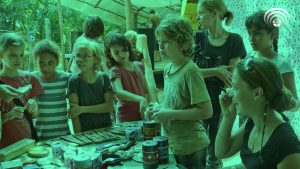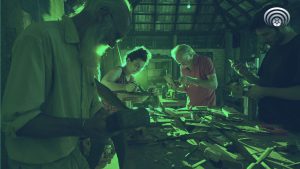Auroville, often referred to as the City of Dawn, stands as a beacon for the circular economy in action. This article delves into how Auroville’s commitment to reducing waste and promoting sustainability has led to innovative practices that prioritize resource efficiency, recycling, and reusing materials. These circular economy principles contribute to a more eco-conscious, environmentally responsible, and harmonious community.
Auroville: A Circular Economy Pioneer: Auroville’s commitment to sustainability extends to its economic and environmental practices. At its core, Auroville embodies the principles of the circular economy, where resources are used efficiently, waste is minimized, and environmental responsibility is paramount.
Reducing Waste and Resource Efficiency: Auroville emphasizes the reduction of waste as a fundamental principle. This begins with the efficient use of resources in every aspect of community life, including agriculture, construction, and daily living. By optimizing resource usage, Auroville minimizes waste and its environmental impact.
Circular Economy in Construction: Auroville’s construction industry is a prime example of the circular economy in action. Reclaimed and recycled materials are widely used, ensuring that building projects are not only sustainable but also eco-friendly. This approach minimizes waste and promotes responsible building practices.
Sustainable Agriculture and the Circular Economy: Sustainable agriculture practices in Auroville are rooted in circular economy principles. Techniques such as organic farming, permaculture, and regenerative agriculture not only ensure a healthy environment but also promote efficient resource utilization, reducing waste in the farming process.
Recycling Initiatives: Auroville has established effective recycling initiatives, contributing to the circular economy. Recycling centers within the community process materials such as paper, glass, and plastics, reducing the amount of waste sent to landfills and promoting a more sustainable approach to resource management.
Reusing and Upcycling: Auroville places great importance on reusing and upcycling materials. Artisans and craftspeople within the community create innovative products from discarded items, demonstrating that waste can be transformed into valuable resources, further reducing the need for new materials.
Eco-Tourism and Sustainable Practices: Auroville’s emphasis on eco-tourism aligns with the circular economy. Sustainable tourism initiatives promote responsible travel practices, including reducing waste, conserving resources, and engaging in environmentally friendly activities.
Educational Initiatives: Nurturing Circular Thinkers: Auroville’s educational institutions play a pivotal role in nurturing circular thinking. They educate students on the importance of the circular economy, preparing them for careers that prioritize resource efficiency and waste reduction.
Innovative Business Models: Many businesses in Auroville have adopted innovative business models that are founded on circular economy principles. These models promote the efficient use of resources, reducing waste, and contributing to a more sustainable way of doing business.
A Model for the World: Auroville’s circular economy principles extend beyond its own borders. The community actively shares its experiences and insights with other regions and communities worldwide, serving as an inspiration for more sustainable and circular practices.
Auroville’s message is clear: the circular economy is not just a concept; it’s a practical reality that communities can implement to foster more eco-conscious, environmentally responsible, and harmonious living.
Conclusion: Auroville’s dedication to the circular economy serves as a shining example of sustainable living in action. The community’s message to the world is that the circular economy principles can be embraced and implemented in various aspects of life, leading to a more eco-conscious, environmentally responsible, and harmonious future for all.



